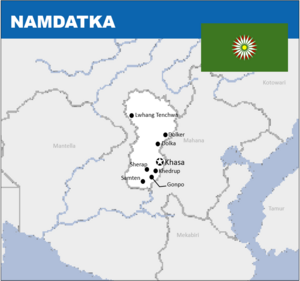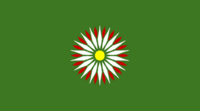Namdatka: Difference between revisions
No edit summary |
No edit summary |
||
| Line 2: | Line 2: | ||
{{Infobox country | {{Infobox country | ||
|micronation = <!--yes if a micronation--> | |micronation = <!--yes if a micronation--> | ||
|conventional_long_name = | |conventional_long_name = Republic of the Union of Namdatka <!--Formal or official full name of the country in English--> | ||
|native_name = | |native_name = ཨཿོམེ་ཨོཕ༹་ཐེ་ཊིབེཏ ({{wp|Dzongkha|Namdatkan}}) <!--Country's name (usually full name) in its native language, hence in italics (double quotemarks)--> | ||
|common_name = {{PAGENAME}} <!--Common name in English (used for wikilinks, captions, and to produce a default iso3166 code)--> | |common_name = {{PAGENAME}} <!--Common name in English (used for wikilinks, captions, and to produce a default iso3166 code)--> | ||
|status = <!--Status of country, especially useful for micronations--> | |status = <!--Status of country, especially useful for micronations--> | ||
| Line 158: | Line 158: | ||
===Rai Monarchal Period=== | ===Rai Monarchal Period=== | ||
During the 15th and 16th centuries Namdatka's eastern regions, especially around the city of Lwhang Tenchwa, existed a monarchy that grew out of the ancient Gyeltshen Dynasty that ruled over the realm it called Tsheringa. This monarchy made claim to an area of around 98,000 km2, containing around 890,000 people at the time. The land was arid and dry, leading to a majority of the population being situated around the Penden River in settlements around Lwhang Tenchwa. The Rai Monarchy ruled this kingdom with an iron-fist, however it flourished in comparison to the eastern regions at the time, which were under the subjugation of [[Mahana]]. | During the 15th and 16th centuries Namdatka's eastern regions, especially around the city of Lwhang Tenchwa, existed a monarchy that grew out of the ancient Gyeltshen Dynasty that ruled over the realm it called Tsheringa. This monarchy made claim to an area of around 98,000 km2, containing around 890,000 people at the time. The land was arid and dry, leading to a majority of the population being situated around the Penden River in settlements around Lwhang Tenchwa. The Rai Monarchy ruled this kingdom with an iron-fist, however it flourished in comparison to the eastern regions at the time, which were under the subjugation of [[Mahana]]. | ||
The monarchy continued it's existence up until the foundation of Namdatka in 1780, where they joined the Union of Namdatka in exchange for Namdatka taking up the Rai Monarchy. | |||
===War for Independence=== | ===War for Independence=== | ||
{{Main|Namdatkan People's Revolution}} | {{Main|Namdatkan People's Revolution}} | ||
Revision as of 22:09, 25 June 2022
Republic of the Union of Namdatka ཨཿོམེ་ཨོཕ༹་ཐེ་ཊིབེཏ (Namdatkan) | |
|---|---|
|
Flag | |
 Map of Namdatka | |
| Capital | Khasa |
This article is incomplete because it is pending further input from participants, or it is a work-in-progress by one author. Please comment on this article's talk page to share your input, comments and questions. Note: To contribute to this article, you may need to seek help from the author(s) of this page. |
Namdatka (Namdatkan: ཨཿོམེ་ཨོཕ༹་ཐེ་ཊིབེཏ་), officially the Republic of the Union of Namdatka is a landlocked country in central Orient. With a population of around 7.5 million and a land area of around X km2, Namdatka is one of the Orient's smallest nations. It is bordered by Mahana to the east and closely to Mantella in the west. Namdatka is located entirely within the Careleon Plateau, with most people living in the cooler eastern regions on the border with Mahana. The capital is Khasa but other large metropolitan areas include Dolka, Khedrup and Gonpo. "Namdatka" roughly translates to "Land of the Careli" in Namdatkan.
The nation shares a lot of history with it's neighbour Mahana, as well as Mekabiri. It spent a majority of it's history as part of a great un-unified tribe grouping located in the Careleon Plateau, before unification of the clans in 1512 by General Yangdon, a legendary tactician.. Since then, Namdatka has faced little opposition to their independence besides the war they shared with Mahana in the 16th century, in which they pushed into Mahanan lands in hope to gain land in the Careleon Plateau, unsuccessfully. In 1920, Namdatka had a notable civil war, with the Communist forces being supported by the Mahanan monarchy.
Etymology
(WIP.)
Geography
Climate
The climate is severely dry nine months of the year, and average annual snowfall is only 46 cm due to the rain shadow effect. Eastern passes and regions receive small amounts of fresh snow and occasionally rain throughout the course of the year. Low temperatures are prevalent throughout these eastern regions, where bleak desolation is unrelieved by any vegetation bigger than a low bush, and where the wind sweeps unchecked across vast expanses of arid plain. The Oriental Narope Rains have influence on it's eastern regions, with some years having a much higher average rainfall than others.
(WIP. Landscape. Climate.)
History
Prehistory
WIP.
Kzhonkan Migration
WIP.
Gyeltshen Dynasty
WIP.
Religious Tension
WIP.
Rai Monarchal Period
During the 15th and 16th centuries Namdatka's eastern regions, especially around the city of Lwhang Tenchwa, existed a monarchy that grew out of the ancient Gyeltshen Dynasty that ruled over the realm it called Tsheringa. This monarchy made claim to an area of around 98,000 km2, containing around 890,000 people at the time. The land was arid and dry, leading to a majority of the population being situated around the Penden River in settlements around Lwhang Tenchwa. The Rai Monarchy ruled this kingdom with an iron-fist, however it flourished in comparison to the eastern regions at the time, which were under the subjugation of Mahana.
The monarchy continued it's existence up until the foundation of Namdatka in 1780, where they joined the Union of Namdatka in exchange for Namdatka taking up the Rai Monarchy.
War for Independence
At the end of the 18th century, during the times of great religious struggle in neighbouring Mahana, a movement arose with the Namdatkan people group living in Mahana which eventually lead to a diplomatic feedback loop which slowly turned into an escalated conflict.
The revolution began on the 6th May 1780, with uprising beginning in the city of Khasa. It initially was met with resistance from the Mahanans however due to struggles within the rest of the country the decision was made to grant the nation their independence only a month after, on the 17th June 1790. The war, despite being short-lived, lead to independence which lasts into present day.
Dungchu Dictatorship
WIP.
Post-Dictatoral Namdatka
(WIP. Look at neighbours Mahana and Mantella.)
Politics
(WIP. Government. Political parties. Foreign relations. Military.)
Economy
(WIP. Eployment. Exports. Energy. Transport. Media. Currency.)
Demographics
(WIP. Ethnic groups. Language. Religion. Health. Education.)
Cultures
(WIP. Literature. Visual arts. Music. Cuisine. Sport.)
